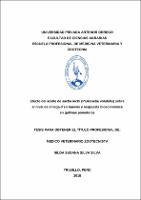Efecto del aceite de sacha inchi (Plukenetia volubilis) sobre el nivel de omega-3 en huevos y respuesta bioeconómica en gallinas ponedoras

Ver/
Descargar
(application/pdf: 1009.Kb)
(application/pdf: 1009.Kb)
Fecha
2018Autor(es)
Silva Silva, Nilda Susana
Metadatos
Mostrar el registro completo del ítemResumen
El objetivo del presente estudio fue evaluar el efecto de la adición del aceite de Sacha inchi (Plukenetia volubilis) en la dieta de las gallinas ponedoras como fuente de ácidos grasos poliinsaturados, principalmente linolénico para su deposición.
Se utilizaron 140 gallinas de la línea Hisex Brown, divididos en cuatro tratamientos, que consistieron en la incorporación del aceite de sacha inchi en la dieta en niveles de 0.0% (SI0), 1.5% (SI15), 3.0% (SI30), 4.5% (SI45). Las aves del estudio fueron distribuidas a través de un DCA con cuatro tratamientos, cinco repeticiones y siete aves por repetición. Las aves ingresaron al experimento con 26 semanas de edad y fueron evaluados los niveles de omega-3 en los huevos, el peso corporal, consumo de alimento, masa de huevos, peso de huevos, índice de conversión alimenticia (ICA) y merito económico.
La inclusión del aceite de sacha inchi del 1.5% en la dieta de las gallinas ponedoras influye en un mayor contenido de ácidos grasos omega-3 en el huevo.
Los índices productivos encontrados como promedio de todas las semanas evaluadas mostraron una respuesta lineal altamente significativa (P>0.01) de aumento a mayor inclusión de aceite de Sacha inchi. El mejor mérito económico, se consiguió con la inclusión de 3.0% (SI30) de aceite de sacha inchi en la dieta.
Se concluye que la inclusión de Sacha Inchi en la dieta de las gallinas ponedoras mejoran los índices productivos y el nivel de omega 3 en el huevo. The objective of the present study was to evaluate the effect of the addition of Sacha inchi oil (Plukenetia volubilis) on the diet of laying hens as a source of polyunsaturated fatty acids, mainly linolenic for their deposition.
140 hens of the Hisex Brown line were used, divided into four treatments, which consisted of the incorporation of sacha inchi oil into the diet at levels of 0.0% (SI0), 1.5% (SI15), 3.0% (SI30), 4.5 % (SI45). The birds of the study were distributed through a DCA with four treatments, five repetitions and seven birds per repetition. The birds entered the experiment at 26 weeks of age and were evaluated the levels of omega-3 in eggs, body weight, feed consumption, egg mass, egg weight, feed conversion ratio (ICA) and economic merit.
The inclusion of sacha inchi oil of 1.5% in the diet of laying hens influences a higher content of omega-3 fatty acids in the egg.
The productive indices found as average of all the weeks evaluated showed a highly significant linear response (P> 0.01) of increase to greater inclusion of Sacha inchi oil. The best economic merit was achieved with the inclusion of 3.0% (SI30) of sacha inchi oil in the diet.
It is concluded that the inclusion of Sacha Inchi in the diet of the laying hens improves the productive indexes and the level of omega 3 in the egg.
Colecciones
- Veterinaria y Zootecnia [219]

